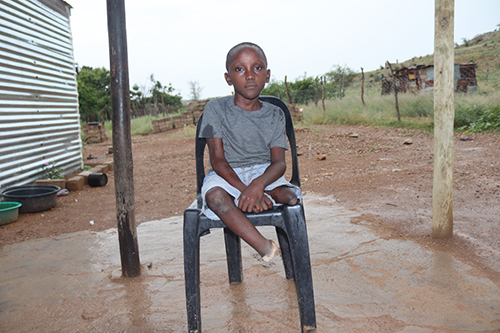Aletta Shikololo
Eight years ago, Johanna Namba (42) received life-changing news that her unborn child had a neural tube defect.
After several tests, her baby was diagnosed with myelomeningocele, better known as spina bifida. Spina bifida occurs when spinal tissue fails to fuse properly during the early stages of pregnancy, leading to a range of lifelong cognitive, mobility, urinary and bowel disabilities.
The condition is often referred to as the ‘snowflake’ condition as no two people are affected the same way. She was told her child may never be able to walk due to it. According to various health sources, spina bifida patients can develop mobility issues, bladder or bowel incontinence and hydrocephalus, a build-up of fluid in the ventricles within the brain, which often requires a shunt to drain the fluid.
As for Erastus Shaalukeni (Namba’s son), he has mobility issues and bladder incontinency. He has had several operations since the closure of the hole in his spine.
When he was just an adolescent, he had bones pointing downwards on the soles of his feet lifted by the bone, which has affected how he walks.
“Raising a child with such a condition is very challenging, but it is something I have gotten used to,” she said.
Having envisioned her child’s future from way before he was born, Namba said it has affected her emotionally as things did not line up the way that she viewed it.
“It is a journey, and I have learned to be strong for the both of us. I have had to teach him acceptance and living with confidence despite his condition, and he is actually getting better at it,” she added.
She hopes her son grows into an independent human being.
“I want him to be as independent as possible. Although there is no cure to the disease, I can definitely see him out of nappies,” she said, hopefully.
Local medical practitioner Leena Angala said the condition is quite common, and advised parents taking care of children living with this condition or adults with spina bifida to learn as much as possible about their individual situations.
“There are various types of spina bifida and once the condition is detected, as health practitioners we educate the public on the condition, complications, precautions and give general information on how to live or take care of someone living with it. More information can be found at all health centres,” she observed.
Seeking help
Shaalukeni was in pre-primary at the Frans Oupa Indongo Primary School last year. However, he is taking a gap year due to the severe illness. According to Namba, her son developed a deep wound on his buttocks.
Although Shaalukeni is quite mobile – by means of jumping and crawling – Namba said he needs a wheelchair. Being an unemployed mother of six, she struggles to make ends meet.
“Erastus wears diapers three times a day, and he has so many special needs. The social grant of N$250 we get from the government cannot cater for all his needs. I also have five other children to take care of,” she explained.
Namba is urging the public to assist her with any kind of employment to enable her to cater for her children.
“I would also appreciate any other kind of assistance such as food and diapers,” she pleaded.
According to Namba, Shaalukeni’s left leg and his right foot were also amputated in 2018 in an attempt to give him a prosthetic leg and foot.
But, the prosthetic leg the nurses gave him was straight, and he was unable to walk properly. Despite Namba’s requests for a suitable leg from the hospital, little has been actioned hitherto.
“He was also supposed to get a wheelchair. But till now, he was not given anything,” she added.
– ashikololo@nepc.com.na



